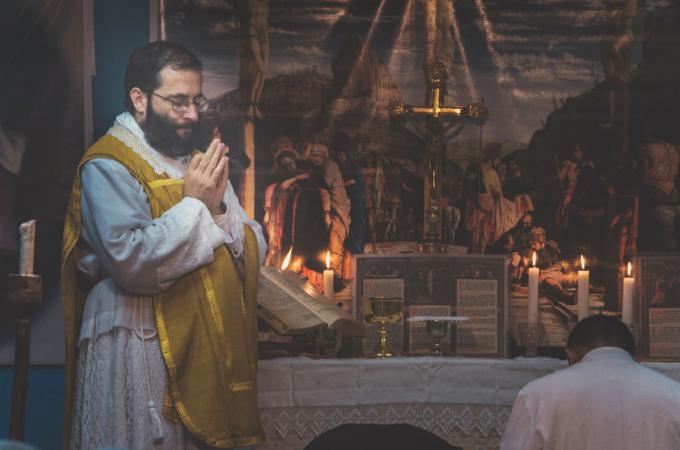Reason for celibacy
Q. My wife and I recently came into communion with the Roman Catholic Church. I know that a hot-button topic in the Church is the question of whether there should be married priests. I have slowly come to the belief that unmarried priests make logical and biblical sense.
Seeing how hard our own parish priest works, it doesn't seem that he would also have the time to care for a family, and I have read the biblical reasoning in Matthew 19:12 and Paul's guidance in First Corinthians. But my question is this: How does the Catholic Church reconcile this teaching with the fact that the chief apostle and first pope, St. Peter, was married? (Camden, North Carolina)
A. In the Latin-rite (Roman) Catholic Church, celibacy is today a prerequisite for ordination to the priesthood. But that has not always been so; it is a discipline that developed over history. (Even today, clerics of Eastern-rite Catholic churches are permitted to marry before ordination.) For the first several centuries of the Christian era, it was common for Latin-rite priests to marry.
As you mention, St. Peter was obviously married, since Luke 4:38 tells the story of Jesus healing Peter's mother-in-law. And St. Paul says in his First Letter to Timothy 3:2 that "a bishop must be irreproachable, married only once, temperate, self-controlled." But over time, the Church came to the realization -- as you yourself suggest -- that a priest is most free to serve the people and his ministry by not having the responsibility of a family, and it was the First Lateran Council in 1123 that finally mandated celibacy for Western clergy.
That requirement, and the practical reason behind it, are reflected in the current Code of Canon Law: "Clerics are obliged to observe perfect and perpetual continence for the sake of the kingdom of heaven and therefore are bound to celibacy which is a special gift of God by which sacred ministers can adhere more easily to Christ with an undivided heart and are able to dedicate themselves more freely to the service of God and humanity" (Canon 277).
Further evidence, though, of the fact that clerical celibacy is not a revealed truth, but a matter of Church law can be found in the fact that, in the United States, several dozen Episcopal and Lutheran married clergy who became Catholic have been allowed to be ordained as Roman Catholic priests while still remaining married.
Q. I was married in the Catholic Church in 1965, divorced in 1976 with two children. I never had the marriage annulled. I married a wonderful man in 1981, but unfortunately he died suddenly in 2018. I go to Mass and receive Communion regularly, and I feel that I am a devout Catholic.
Fast forward to 2021, and I have met a good Catholic man who was divorced but never had the marriage annulled. We have found a good life together and enjoy each other's families. I don't want to remarry because of financial considerations. We want to live together and would like to have this relationship blessed by a Catholic priest. Is there a way that this can take place? Please help. (Illinois)
A. To do want you want -- to have that particular living situation blessed by a Catholic priest -- the Church would have to abandon its biblically based teaching that marriage is a permanent commitment. The Church also believes that a couple should not be living together without being married.
I recognize your desire for the Eucharist and your eagerness to be "a devout Catholic," but to be eligible to receive, one has to be living in concert with the Church's teachings, including those concerning marriage. Please consider meeting with a priest and discussing your situation. Meanwhile, I will pray that you make a decision about your future based on your deeply held faith.
- Father Kenneth Doyle is a columnist for Catholic News Service



















